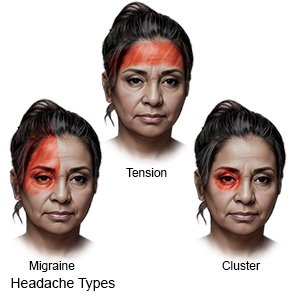Cluster Headache
Medically reviewed by Drugs.com. Last updated on Aug 4, 2025.
A cluster headache is a very painful headache that starts quickly, peaks within 15 minutes, and stops suddenly. The headache usually lasts 30 to 60 minutes but can last up to 3 hours. Cluster headaches follow patterns and often occur at the same time of the day or year. You may have cluster headaches once every other day, or up to 8 each day. A cluster period usually lasts for 2 to 12 weeks but can last longer than a year. Weeks or months may pass before a new cluster period begins. A cluster headache can be triggered by alcohol, medicine, stress, bright light, or heat.
 |
DISCHARGE INSTRUCTIONS:
You or someone close to you should call your local emergency number (911 in the US) if:
- Your pain is so bad you think about attempting suicide.
Return to the emergency department if:
- You feel tired or sleepy.
- You cannot see clearly.
- Your stomach is upset or you are vomiting.
- You have a seizure.
Related medications
Treatment options
The following list of medications are related to or used in the treatment of this condition.
Call your doctor or neurologist if:
- You cannot get enough sleep because of your headaches.
- Your headaches happen each time you are active.
- Treatment does not help your symptoms.
- You have questions or concerns about your condition or care.
Medicines:
You may need any of the following:
- Migraine medicine may be given to relieve your pain quickly.
- Steroids may help reduce pain and swelling. They may also be used to prevent cluster headaches.
- Seizure medicine may be given to prevent cluster headaches.
- Mood stabilizers may be given to prevent cluster headaches. This medicine helps balance chemicals in your brain.
- Take your medicine as directed. Contact your healthcare provider if you think your medicine is not helping or if you have side effects. Tell your provider if you are allergic to any medicine. Keep a list of the medicines, vitamins, and herbs you take. Include the amounts, and when and why you take them. Bring the list or the pill bottles to follow-up visits. Carry your medicine list with you in case of an emergency.
Manage cluster headaches:
- Do not smoke. Cluster headaches are more common among smokers. Ask your healthcare provider for information if you currently smoke and need help to quit. E-cigarettes or smokeless tobacco still contain nicotine. Talk to your healthcare provider before you use these products.
- Do not drink alcohol during a cluster period. Alcohol triggers more headaches during cluster periods.
- Do not travel between altitudes. Altitude changes can trigger headaches. Do not fly on an airplane or travel between places with high and low altitudes.
- Set a regular sleep schedule. Go to sleep and wake up at the same times each day. Changes in sleep patterns may trigger cluster headaches.
- Manage stress. Stress, long hours at work, and emotional challenges can trigger cluster headaches. Find out what works for you to lower stress.
- Keep a headache record. Write down when your headaches start and stop, and exactly what you were doing when they began. Record what you ate or drank and how much you slept in the 24 hours before the headache. Keep track of the things you did to treat your symptoms. Write down if they did or did not help. Do this to learn what triggers your headaches and how to make them go away.
- Work with your healthcare provider to manage your pain. Both pain relievers and medicines used to treat other health conditions can trigger cluster headaches. Go over all your medicines with your healthcare provider. Work with your provider to manage your headache pain and other conditions.
Follow up with your doctor or neurologist as directed:
Write down your questions so you remember to ask them during your visits.
© Copyright Merative 2025 Information is for End User's use only and may not be sold, redistributed or otherwise used for commercial purposes.
The above information is an educational aid only. It is not intended as medical advice for individual conditions or treatments. Talk to your doctor, nurse or pharmacist before following any medical regimen to see if it is safe and effective for you.
Learn more about Cluster Headache
- Advil Dosage Charts for Infants and Children
- Dosage Charts for Infants and Children
- Motrin Dosage Charts for Infants and Children
- Top 9 Things You Must Know About Naproxen
- Tylenol Dosage Charts for Infants and Children
- What are the risks of mixing pain medications and alcohol?
Treatment options
Care guides
- Acute Headache
- Acute Headache in Children
- Cluster Headache
- Migraine Headache
- Migraine Headache in Children
Symptoms and treatments
Medicine.com guides (external)
Further information
Always consult your healthcare provider to ensure the information displayed on this page applies to your personal circumstances.
